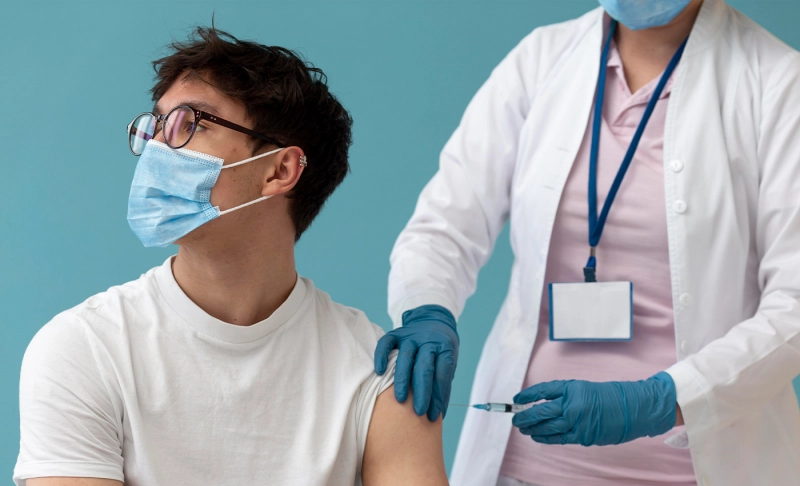By: Gayathri Loka
January 29 2022

Research suggests that a booster is needed to provide high efficacy against Omicron. Vaccines are the best way to prevent serious cases of COVID-19
Research suggests that a booster is needed to provide high efficacy against Omicron. Vaccines are the best way to prevent serious cases of COVID-19 In November 2021, Sajid Javid, the U.K. Health Secretary announced that National Health Service (NHS) workers must be vaccinated against COVID-19 as a condition of employment. Since Javid's statement, many people, including health care workers themselves, have opposed the mandate. The plans were drawn up before the Omicron variant took hold in the U.K. He has since said he is "reflecting" on the policy. A widely-shared article from The Daily Sceptic references a piece in The Guardian, which features a leaked document from the Department of Health and Social Care (DHSC). It notes that the vaccine's lower efficacy rates against COVID-19 may "weaken the case" for vaccine mandates among NHS staff. It features a banner stating "COVID-19 vaccines aren't working." However, the studies do not mean that vaccines are ineffective. The document highlights that two vaccine doses only provide up to 32 percent efficacy against Omicron infection. Importantly, it adds that a booster dose is needed and that while the policy was first developed, two doses of the vaccine offered strong protection against Delta, the dominant strain at the time. Furthermore, the latest COVID-19 vaccine surveillance report from the U.K. Health Security Agency (HSA) dated January 20, 2022, noted that "Several studies have provided evidence that vaccines are effective at preventing infection" and that "The vaccines provide some protection against transmission." The report referred to several studies providing evidence of reduced risk of household transmission from vaccinated cases compared to unvaccinated ones. Another report by the HSA, dated January 14, 2022, noted that vaccine effectiveness after a booster dose against hospital admission is 85-90 percent for the Omicron variant. Logically also reported in December 2021 that non-peer-reviewed studies suggest that Omicron can evade vaccine protection, but vaccines still prevent serious cases of illness. There were protests and demonstrations around the U.K. in opposition to the vaccine mandate. The Royal College of GPs told the BBC that "The deadline for health workers to have a Covid vaccination should be delayed to prevent staff shortages in England." The DHSC said there were no plans to delay, and it was "the right thing to do to protect patients." The Times reported that Javid and MPs are "reflecting" on the policy. However, they also said the patient safety reasons behind it remained unchanged. COVID-19 vaccines have been proven effective in fighting the pandemic. However, studies regarding the Omicron variant are still ongoing. The government has not made a statement about scrapping their vaccine policy for NHS workers but is contemplating its decision. NHS vaccine mandates are controversial and have raised a number of complex ethical concerns. It is true that an official document noted that policymakers should consider research showing that without the booster jab, the vaccine's efficacy wanes. The Daily Sceptic The Guardian article has been presented in a way that is misleading, as it states that this is evidence that vaccines do not work.